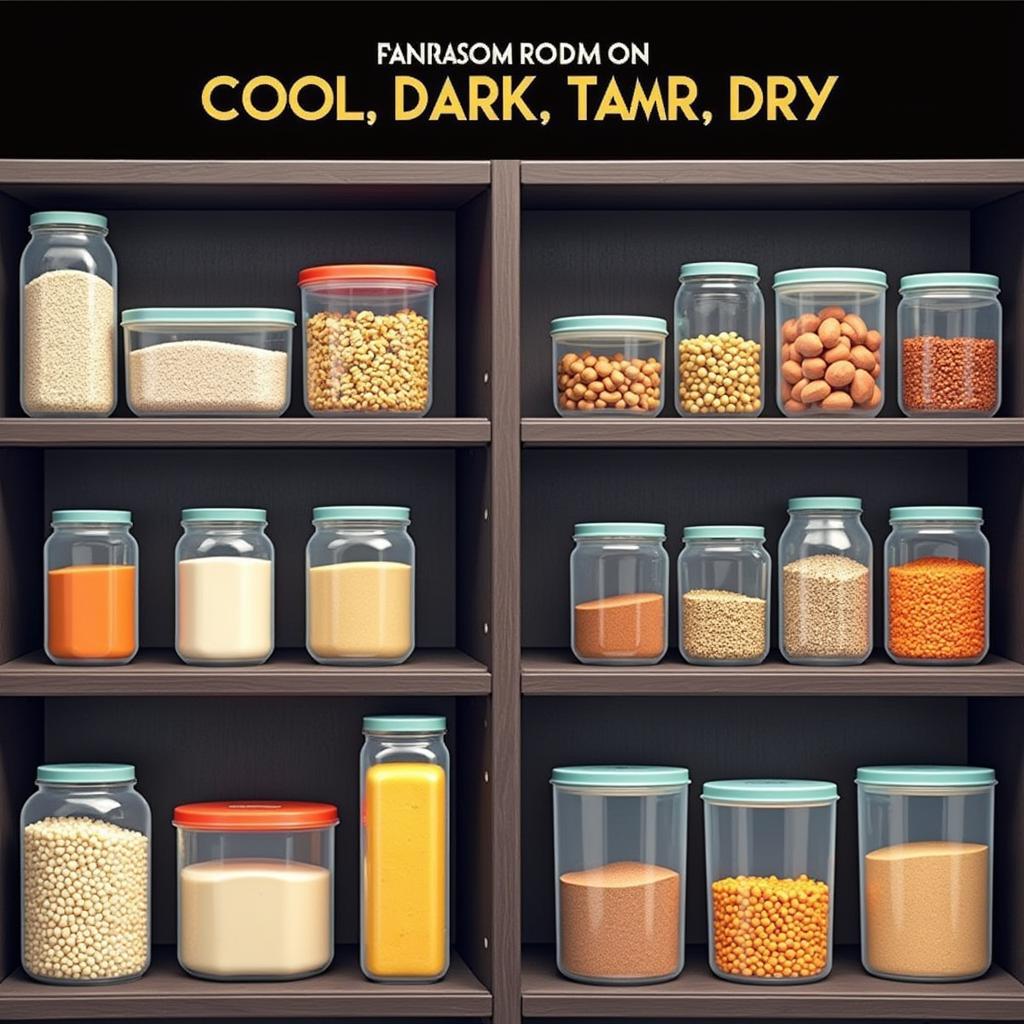Vegan Survival Food is becoming increasingly popular as more people embrace a plant-based lifestyle and prioritize emergency preparedness. This guide dives into the essentials of building a nutritious and sustainable vegan survival food supply. We’ll explore everything from choosing the right foods to storage techniques and meal planning. After reading this guide, you’ll be well-equipped to create a vegan emergency food plan that meets your nutritional needs and keeps you going in times of crisis.
Building Your Vegan Survival Food Stash
Choosing the right vegan survival food involves careful consideration of several factors. Longevity, nutritional value, and ease of preparation are key. Focus on non-perishable items that offer a good balance of protein, carbohydrates, and healthy fats.
- Dried Beans and Lentils: These are excellent sources of protein and fiber, and they store well for extended periods.
- Grains: Quinoa, rice, oats, and other grains provide essential carbohydrates for energy. Opt for whole grains for added nutritional benefits.
- Nuts and Seeds: These are packed with healthy fats, protein, and essential minerals. Choose varieties with a longer shelf life, like almonds, walnuts, and sunflower seeds.
- Dried Fruits and Vegetables: These retain many of their nutrients and provide a source of vitamins and minerals.
- Plant-Based Protein Powders: A convenient and concentrated source of protein, especially helpful for quick meal replacements.
Essential Nutrients for Vegan Survival
Ensuring your vegan survival food plan meets your nutritional needs is crucial. While calorie intake is important for energy, prioritizing essential nutrients is equally vital.
Protein Powerhouses
Protein is essential for muscle repair and overall health. Include a variety of protein sources like beans, lentils, nuts, seeds, and plant-based protein powders in your vegan survival food kit.
Carb Considerations
Carbohydrates are your primary energy source. Choose complex carbohydrates from whole grains like quinoa, rice, and oats. They provide sustained energy and are more nutritious than refined carbohydrates.
Healthy Fats are Key
Healthy fats are essential for brain function and hormone production. Nuts, seeds, and certain dried fruits are great sources. Consider adding flaxseed or chia seeds for an extra boost of omega-3s.
Storage and Preparation Tips for Vegan Survival Food
Proper storage is critical for maintaining the quality and longevity of your vegan survival food.
- Airtight Containers: Store dried goods in airtight containers to protect them from moisture, pests, and oxidation.
- Cool, Dark, and Dry Place: Store your survival food stash in a cool, dark, and dry environment to maximize shelf life.
- First In, First Out: Practice the FIFO method to ensure you’re using the oldest items in your supply first and minimizing waste.
- Meal Planning: Plan your meals ahead of time to ensure a balanced intake of nutrients.
- Water Purification: Access to clean water is crucial. Invest in a reliable water filter or purification tablets.
“Proper storage is the cornerstone of a successful vegan survival food plan,” says Dr. Amelia Green, a registered dietitian specializing in plant-based nutrition. “Protecting your food from moisture and pests is crucial for long-term viability.”
 Vegan Survival Food Storage
Vegan Survival Food Storage
Vegan Survival Food Kits: A Convenient Option
If assembling your own survival food supply seems daunting, pre-made vegan survival food kits are a convenient alternative. These kits offer a pre-selected assortment of non-perishable vegan foods, often with a long shelf life. When choosing a kit, consider the calorie content, nutritional balance, and variety of foods offered. Ensure the kit meets your dietary needs and preferences. If you’re interested in a pre-assembled option for emergency preparedness, you can also order MRE food or consider investing in a 90 day food supply. For those prioritizing organic options, organic survival food kits are also available.
Conclusion
Building a vegan survival food supply is a crucial step in ensuring your preparedness for emergencies. By focusing on nutrient-rich, non-perishable foods and employing proper storage techniques, you can create a sustainable and satisfying vegan survival plan. Don’t wait until it’s too late; start building your vegan survival food stash today.
“Having a reliable source of vegan survival food brings peace of mind,” states Maria Sanchez, a certified emergency preparedness instructor. “Knowing you have a nutritious and sustainable food supply during a crisis reduces stress and allows you to focus on other important aspects of survival.”
When you need support, please contact Phone Number: 02437655121, Email: minacones@gmail.com or visit our address: 3PGH+8R9, ĐT70A, thôn Trung, Bắc Từ Liêm, Hà Nội, Việt Nam. We have a 24/7 customer service team.